Best Logistics Service Providers Ranked for 2025
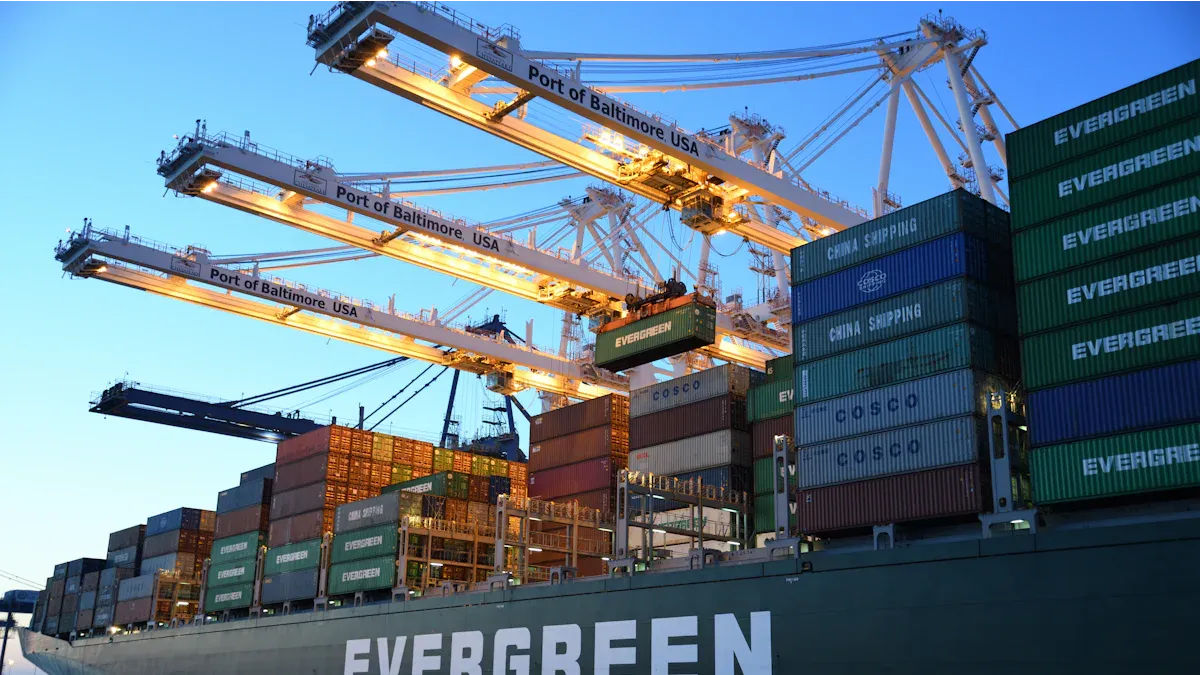
You want to know which companies lead the logistics industry in 2025. Here are the top performers:
Provider | Packages Delivered (2024) | |
|---|---|---|
USPS | 31% | 6.9B |
Amazon | 28% | 6.3B |
UPS | 20-23% | 4.6B |
FedEx | 15% | 3.4B |
Others | ~4% | 0.8B |
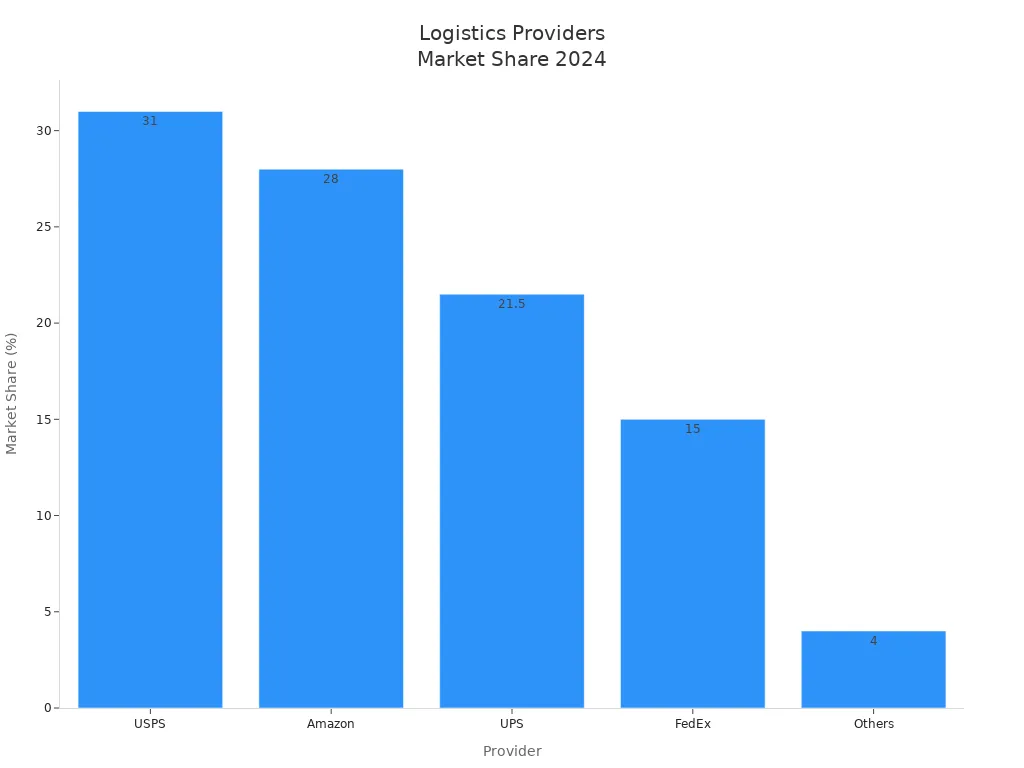
The best logistics service providers stand out because they use digital technology, keep operations efficient, and meet customer needs. You see these leaders excel by managing supply chains with skill and adapting to changes quickly.
Key Takeaways
Top logistics providers like Amazon and DHL excel in global reach and advanced technology, ensuring fast and reliable delivery.
When choosing a logistics partner, prioritize companies with strong customer ratings and a wide service network to enhance your business growth.
Look for providers that utilize automation and real-time tracking to improve efficiency and reduce shipping errors.
Consider sustainability practices in logistics, such as electric vehicles and eco-friendly packaging, to lower your carbon footprint.
Assess your specific shipping needs and industry requirements to find a logistics provider that aligns with your business goals.
Top 10 Best Logistics Service Providers
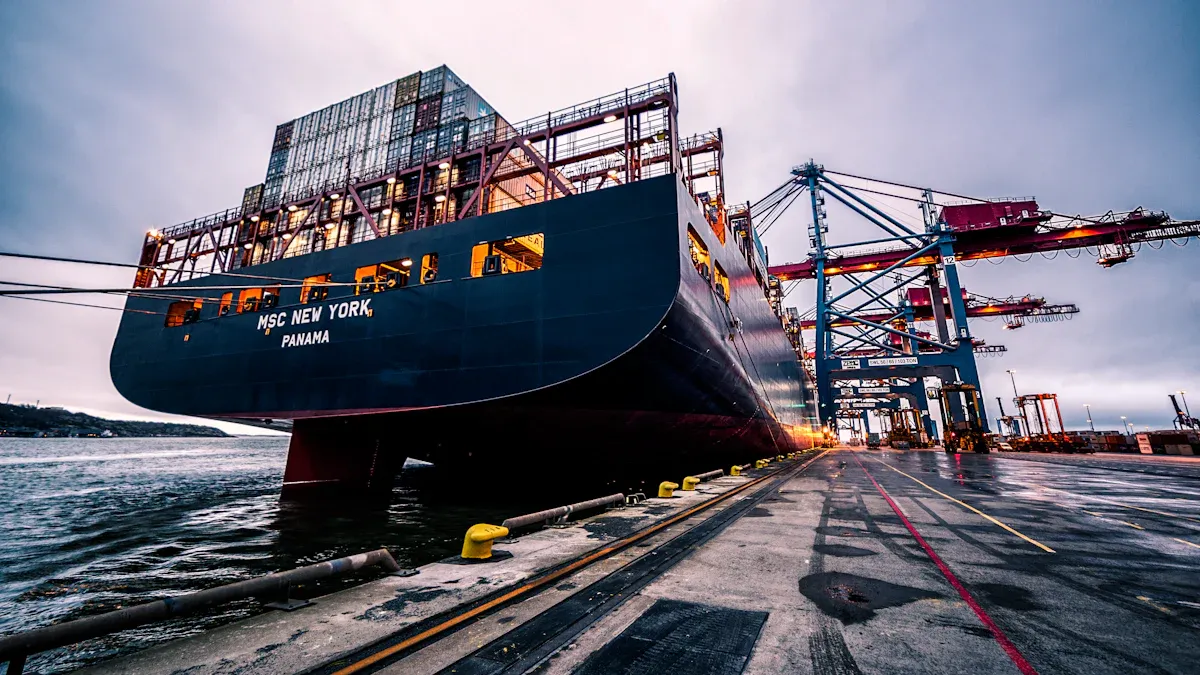
Ranked List Overview
You want to know which companies lead the logistics world in 2025. The best logistics service providers offer global coverage, advanced technology, and reliable delivery. These companies help you move goods quickly and safely, no matter where your customers live. Here is a ranked list of the top 10 providers for 2025. This table shows their global reach and main service offerings:
Rank | Provider | Global Reach | Service Offerings |
|---|---|---|---|
1 | Amazon | 310M+ users, 175 fulfillment centers worldwide | End-to-end supply chain, global logistics, warehousing, multi-channel fulfillment |
2 | DHL | 50+ countries, 1,600 warehouses | Full supply chain solutions, automation, robotics |
3 | UPS | 200+ countries and territories | Package delivery, supply chain visibility technology |
4 | FedEx | 5,000+ facilities, 220+ countries | Business solutions, sustainability initiatives |
5 | A.P. Moller - Maersk | 130 countries, 54 terminals | Logistics automation, warehousing, sustainability |
6 | Kuehne + Nagel | 1,300 locations, 100 countries | 3D model simulations, real-time visibility tools |
7 | DSV | 90+ countries, 3,000+ offices | Custom transport and logistics plans |
8 | CEVA Logistics | 170+ countries | Comprehensive supply chain solutions |
9 | C.H. Robinson | 83,000 customers, 450,000 carriers | Transportation management, tailored solutions |
10 | Nippon Express | 56 countries, 3,000+ locations | Goods transportation, focus on sustainability |
These companies stand out because they serve many countries and offer a wide range of services. You can trust them to handle complex shipping needs and deliver on time.
Ranking Criteria
You may wonder how experts rank the best logistics service providers. The ranking uses several key factors:
Service Quality: You want your packages to arrive safely and on time. Companies with high delivery accuracy and few complaints score higher.
Innovation and Technology: The top providers use automation, robotics, and real-time tracking. These tools help you see where your goods are at any moment.
Customer Satisfaction: Ratings from real customers show how well each company meets your needs. For 2025, Amazon Logistics leads with a 4.5 out of 5 rating, while C.H. Robinson scores 4.6 out of 5. Here is a chart showing customer satisfaction for the top companies:
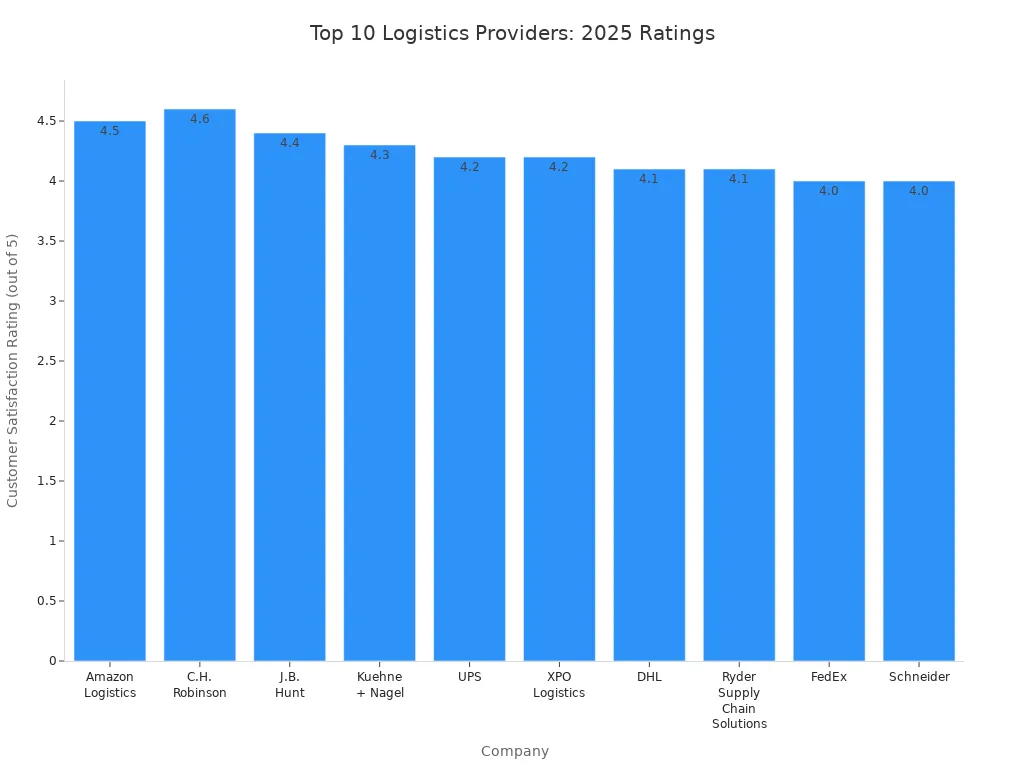
Global Reach: The best logistics service providers operate in many countries. This means you can ship almost anywhere.
Revenue and Scale: Large companies often have more resources to invest in new technology and better service. For example, Amazon leads with $156 billion in revenue for 2024.
Tip: When you choose a logistics partner, look for strong customer ratings and a wide service network. This helps your business grow and keeps your customers happy.
You can see that the best logistics service providers combine technology, global coverage, and high customer satisfaction. These qualities help you deliver products faster and more reliably.
Company Profiles
Amazon
You see Amazon as a leader in logistics because it uses advanced technology and a vast network. In 2025, Amazon operates over 1,500 fulfillment centers worldwide. These centers use more than 750,000 robots and AI-driven systems to speed up order processing. Amazon's logistics network includes over 40,000 semi trucks, 30,000 vans, and 110 aircraft. This helps Amazon deliver over 9 billion U.S. Prime purchases with same- or next-day speed. Many rural communities now get faster delivery, with access growing by 60%. Amazon also started three-hour delivery in some cities.
Amazon tracks its performance using several key metrics:
KPI | Description |
|---|---|
Inventory Accuracy | Matches recorded stock with actual inventory |
Order Fulfillment Rate | Percentage of error-free orders shipped |
On-Time Shipping | Measures if deliveries arrive as scheduled |
Return Rate | Tracks reasons for customer returns |
Cost Per Order | Shows fulfillment efficiency |
Warehouse Utilization | Maximizes storage space |
Customer Satisfaction | Reflects overall customer experience |
Note: Amazon's use of robotics and automation sets it apart from other logistics companies. You benefit from faster, more reliable deliveries.
DHL Supply Chain & Global Forwarding
DHL stands out for its global reach and strong focus on sustainability. You find DHL in over 50 countries, operating 1,600 warehouses. DHL aims to make its operations greener by using biofuels and renewable energy. By 2025, 80% of DHL's energy comes from renewable sources. The company also works to reduce water use and achieve zero-waste certification for all warehouses.
Initiative | Goal/Details |
|---|---|
Biofuels and renewable energy | 80% renewable energy by 2025 |
Water conservation | 15% less water used per unit by 2025 |
Zero-waste facilities | 100% warehouses zero-waste certified by 2025 |
Electrification of the fleet | 50% of vehicles electric by 2025 |
DHL uses automation and robotics to improve efficiency. You can rely on DHL for both speed and eco-friendly shipping.
UPS
UPS remains one of the best logistics service providers because of its delivery reliability and global presence. In 2025, UPS uses advanced route optimization software and automated sorting facilities. About 66% of UPS's volume is processed through automated systems, which helps during busy seasons. UPS is the world's most valuable logistics brand, valued at $32.6 billion for the 11th year in a row.
UPS operates in over 200 countries and territories.
The company invests in technology to improve delivery speed and accuracy.
UPS's brand value decreased by 6% from last year, but it still leads the industry.
Tip: You can trust UPS for reliable deliveries and strong customer service, especially if your business ships worldwide.
Kuehne + Nagel
Kuehne + Nagel has grown its market share in both sea and air logistics in 2025. You benefit from their 2% increase in sea logistics volume and 7% growth in air logistics. The company reported a net turnover of CHF 12.5 billion, showing strong financial health. Kuehne + Nagel uses AI and automation to predict issues, optimize routes, and reduce repetitive tasks. The Internet of Things (IoT) gives you real-time tracking and better control over shipments.
AI and automation improve logistics operations.
IoT enables real-time shipment monitoring.
Advanced data analytics help you make smarter decisions.
DB Schenker
DB Schenker focuses on digitalization and sustainability. You see the company investing in low-carbon freight solutions and electric vehicles. DB Schenker's Circular Economy Logistics product line supports reverse logistics and refurbishment of electronic devices. The company aims to cut greenhouse gas emissions by 40% per tonne-km by 2030. DB Schenker also collaborates with partners to test electric autonomous trucks and eco-friendly packaging.
Reverse logistics helps reduce waste and supports sustainability.
Electric vehicles and low-carbon warehousing lower environmental impact.
DB Schenker offers Eco Solutions to help you reduce CO2 emissions.
CEVA Logistics
CEVA Logistics delivers high customer satisfaction. In 2025, CEVA won the 'Best Logistics Service Provider – Air' award at the AFLAS Awards. The company launched new services, like the Wuxi-Chicago charter program, to meet changing market needs. You can count on CEVA for reliable air and ground logistics solutions.
Note: CEVA's focus on service excellence makes it a strong choice for businesses needing flexible logistics.
ECHO Global Logistics
ECHO Global Logistics gives you access to a large network and advanced technology platforms. The company has over 60 locations in North America and works with more than 50,000 transportation providers. ECHO's technology platforms include EchoConnect, EchoShip, EchoDrive, and EchoAccelerator.
Aspect | Details |
|---|---|
Headquarters | Chicago |
Locations | Over 60 in North America |
Transportation Providers | 50,000+ |
Technology Platforms | EchoConnect, EchoShip, EchoDrive, EchoAccelerator |
Services Offered | Freight brokerage, Managed Transportation, Truckload, LTL, Intermodal, Temperature-Controlled, Warehousing |
Clients | 35,000 |
You can use ECHO's digital tools to manage shipments and track deliveries in real time.
Hub Group
Hub Group offers a wide range of logistics solutions and strong performance in 2025. The company reported an estimated revenue of $3.6 to $3.7 billion for the year. Hub Group specializes in intermodal and transportation services, with $561 million in revenue for this segment in Q3 2025. Logistics revenue reached $402 million.
Segment | Revenue (Q3 2025) | Operating Income (Q3 2025) |
|---|---|---|
Intermodal and Transportation | $561 million | $16 million (2.8%) |
Logistics | $402 million | $24 million (5.9%) |
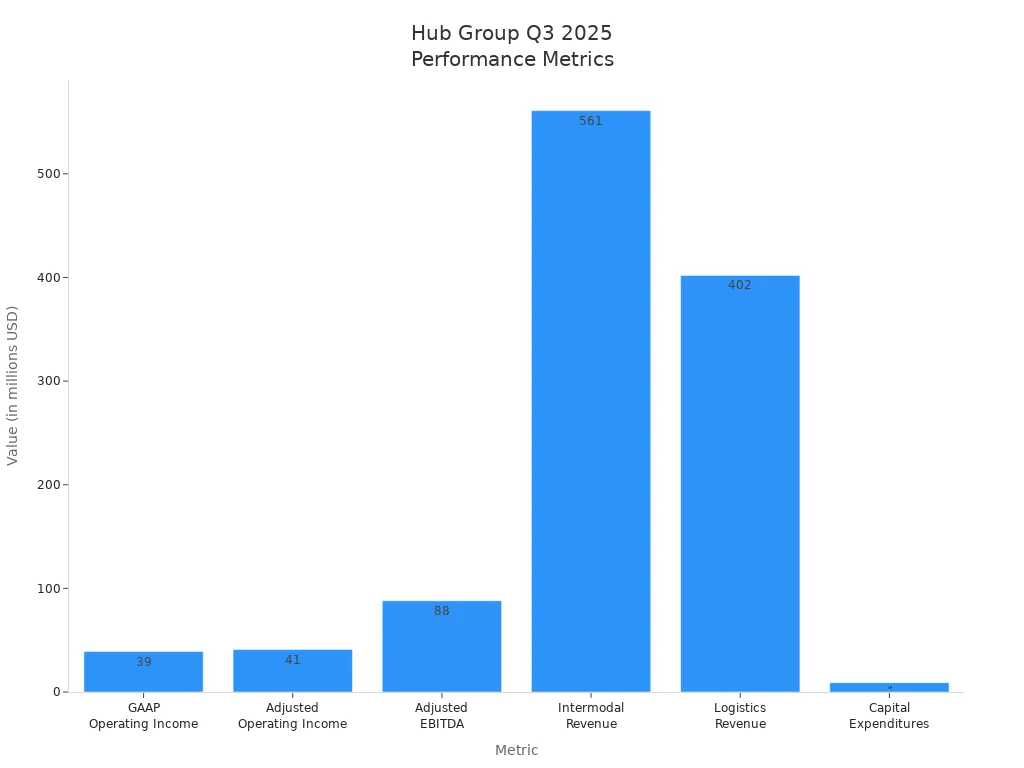
You can rely on Hub Group for both transportation and logistics management.
Flexport
Flexport stands out for its digital innovations and rapid growth. The company reached a valuation of $8 billion in 2025. Flexport launched an AI-powered shipment planning tool in August 2025. This tool uses predictive analytics to manage disruptions and optimize routes in real time.
Innovation Type | Description |
|---|---|
AI-Powered Shipment Planning | Integrates predictive analytics for real-time disruption management and route optimization |
You benefit from Flexport's digital-first approach and strong market presence.
ShipBob
ShipBob supports e-commerce businesses with a global fulfillment network. The company operates over 50 fulfillment centers in the United States, Canada, the United Kingdom, the European Union, and Australia. ShipBob offers real-time and historical stock tracking, shipment tracking, and inventory projections. You can integrate ShipBob with various e-commerce platforms to streamline your order fulfillment.
Over 50 fulfillment centers worldwide
Real-time inventory and shipment tracking
Easy integration with e-commerce channels
XPO Logistics
XPO Logistics invests heavily in AI and automation. In 2025, XPO reduced transportation costs and outsourced linehaul miles by using new AI-powered models. The company uses 100% electric trucks and HVO biofuel, cutting CO₂ emissions by over 215,000 kg in 2024. XPO also partners with SKF to add more electric trucks by 2026.
You benefit from XPO's focus on sustainability and cost savings.
C.H. Robinson
C.H. Robinson gives you access to a vast global logistics network. The company serves 83,000 customers and works with 450,000 carriers. C.H. Robinson's Edge Report reaches 14,000 logistics leaders each month, making it a top source for industry insights.
Statistic/Rating | Value |
|---|---|
Monthly readership of the Edge Report | 14,000 logistics leaders |
Ranking in logistics content referred to by AI | No. 1 |
Organic traffic compared to competitors | 3-10 times bigger |
You can trust C.H. Robinson for transportation management and tailored logistics solutions. Many shippers rely on C.H. Robinson to manage risks like forecasting uncertainty and supply chain disruptions.
Choosing from the best logistics service providers helps your business stay competitive and resilient in 2025.
What Logistics Service Providers Do
Core Services
You rely on logistics service providers to move goods from one place to another. These companies offer many core services that help your business run smoothly. You can see how they use modern fleets, advanced tracking, and smart warehouses to deliver products safely and quickly.
Here is a table showing the main services you get from top logistics providers in 2025:
Core Services | Description |
|---|---|
Full Truckload (FTL) & Less-Than-Truckload (LTL) | Nationwide coverage with dry vans, reefers, flatbeds, and specialty trailers. |
Container Drayage & Last-Mile Delivery | Port-to-door solutions with real-time tracking through digital platforms. |
Warehousing & Fulfillment | Bonded warehouses, Amazon FBA-approved fulfillment, pick-and-pack, transload, and cross-dock. |
Hazmat Transport & Value-Added Services | Packaging, crating, customs clearance, event logistics, and reverse logistics. |
Warehousing & Distribution | Just-in-time transportation to improve delivery precision. |
Transportation & Logistics Management | Management for leading players in many industries. |
Quality Inspection & Rework | Services to enhance product quality for automotive and manufacturing. |
Warehousing, distribution, and global network reach. | |
Freight Forwarding | Integrated logistics for complex supply chains, including sea and air freight. |
Tip: You can choose the right service based on your shipping needs. Many providers offer flexible options, so you get solutions that fit your business.
Industry Specialties
You find that logistics companies often focus on certain industries. This helps you get specialized support for your products. Providers use temperature-controlled trucks, bulk liquid carriers, and custom solutions for different sectors.
Here is a table showing which industries top providers serve:
Provider | |
|---|---|
DHL | Healthcare, Retail |
FedEx Supply Chain | Healthcare |
UPS | Pharmaceuticals |
Seafrigo | Food, Pharmaceuticals, Cosmetics |
Suttons Group | Chemicals, Food and Beverage, Pharmaceuticals |
You see logistics providers working with these industries:
Healthcare
E-commerce
Food
Pharmaceuticals
Chemicals
Temperature-controlled supply chain solutions for perishable goods
Bulk liquids and gases transportation
Note: You can trust specialized providers to handle sensitive products, like medicine or food, with extra care. This keeps your shipments safe and meets industry standards.
Choosing a Provider
Assessing Needs
You should start by looking at your business goals and shipping requirements. Think about the size of your company and the types of products you ship. If you sell food or medicine, you may need temperature-controlled shipping. If you serve customers in many countries, you need a provider with global coverage. Choosing a logistics partner with experience in your industry can give you an advantage. This helps your shipments move smoothly and keeps your customers happy.
Tip: Write down your must-have services before you compare providers. This makes your search easier and faster.
Key Factors
When you compare the best logistics service providers, focus on these important points:
Researching the company’s reputation
Assessing the range of services offered
Checking geographic coverage
Ensuring data security
Evaluating customer service
You should also look for providers who use real-time tracking and automated systems. These tools help you see where your shipments are and reduce mistakes. Many top companies use advanced systems like TMS (Transportation Management System) and WMS (Warehouse Management System). A flexible partner can adjust to your changing needs and keep your business running smoothly.
Questions to Ask
Before you choose a provider, ask these questions:
Question | Why It Matters |
|---|---|
What industries do you serve? | Shows if they have experience with your products. |
How do you handle urgent or unexpected shipments? | Tests their flexibility. |
What technology do you use for tracking and reporting? | Helps you stay informed about your shipments. |
How do you support customers if problems happen? | Good support can solve issues quickly. |
Can you scale services as my business grows? | Ensures they can keep up with your needs. |
Asking the right questions helps you find a provider who fits your business and supports your growth.
Logistics Trends for 2025
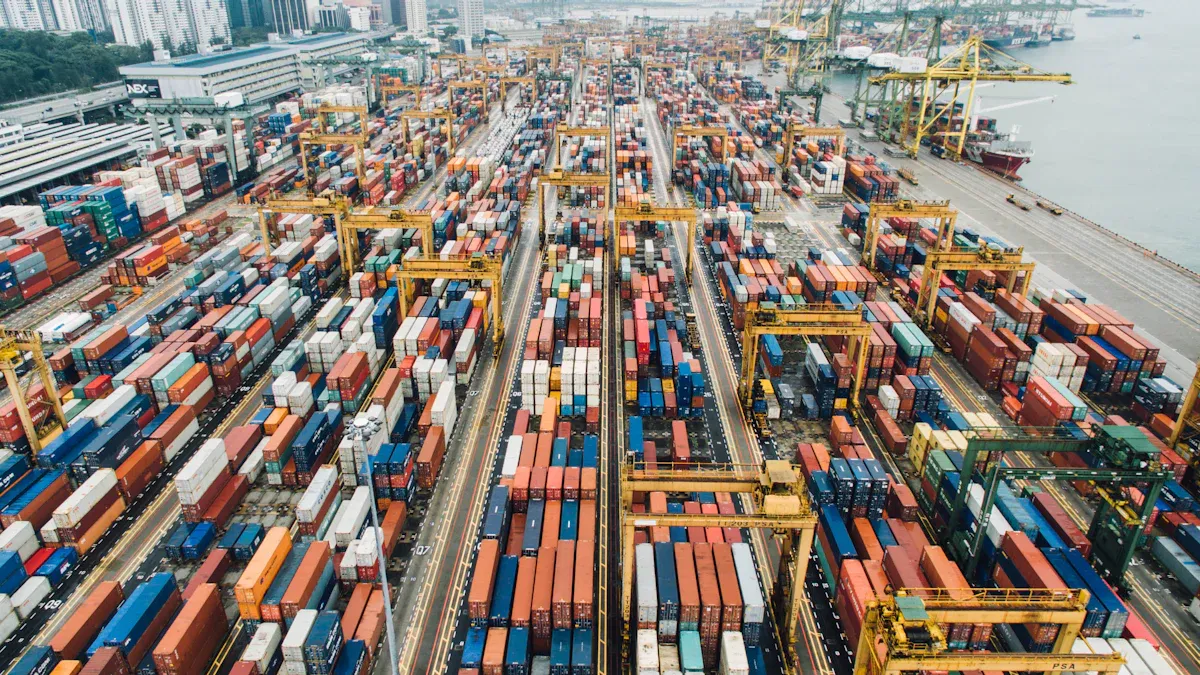
Technology & AI
You see technology changing logistics every day. In 2025, you benefit from new tools that make shipping faster and smarter. Companies use AI to plan the best delivery routes and predict what customers will order next. Robots help workers in warehouses pick and pack items quickly. You notice more companies using autonomous vehicles and drones to deliver packages, which helps solve driver shortages and speeds up deliveries.
Here are some key technology trends you will notice:
AI-driven route optimization and demand forecasting
Advanced robotics for warehouse management
Autonomous mobile robots and guided vehicles for safety and speed
Real-time data and analytics for better decisions
Blockchain for tracking goods and payments
Hyper-personalized customer experiences using AI
Tip: When you choose a logistics partner, look for companies that use these technologies. You will get faster service and better tracking.
Sustainability
You care about the environment, and so do logistics companies. In 2025, you see more electric and low-emission vehicles on the road. Companies use route optimization to save fuel and lower emissions. Many providers switch to alternative fuels like LNG, CNG, and biodiesel. You also see more eco-friendly packaging, such as recyclable and biodegradable materials.
Sustainability practices you will find include:
Electric vehicles for short-range deliveries
Right-sized packages to cut waste
Reusable packaging in closed-loop systems
Route planning to reduce fuel use
Note: Choosing a provider with green practices helps your business lower its carbon footprint.
E-commerce Solutions
You shop online more than ever. Logistics companies help you get your orders quickly by building micro-fulfillment centers close to cities. These centers speed up delivery and keep costs low. Providers connect online and offline sales channels, so you get a smooth shopping experience. You also see better tracking and faster returns.
Key e-commerce solutions in 2025:
Micro-fulfillment centers for fast delivery
Integration of online and offline channels
Real-time order tracking and easy returns
You can expect logistics to keep getting smarter, greener, and faster as these trends grow.
You want your business to grow and succeed in 2025. Picking the right logistics service provider helps you deliver products faster and keep customers happy. Each company offers unique strengths, so you should match their services to your needs.
Remember: Using the rankings and selection tips gives you an advantage in making smart choices.
Review provider strengths before you decide.
Use technology and customer ratings to guide your selection.
Choose a partner that supports your business goals.
FAQ
What is a logistics service provider?
A logistics service provider helps you move goods from one place to another. You get services like shipping, warehousing, and tracking. These companies use technology to make deliveries faster and safer.
How do you choose the best logistics company for your business?
You should look at your shipping needs, company size, and industry. Check customer reviews and technology features. Ask about global coverage and support. Use a checklist to compare providers.
Why does technology matter in logistics?
Technology helps you track shipments, plan routes, and avoid delays. You see real-time updates and get faster deliveries. Companies use AI and automation to improve accuracy and save money.
Can logistics providers handle special products like medicine or food?
Yes, many providers offer temperature-controlled shipping and special handling. You should ask about their experience with your product type. Look for certifications and safety records.
See Also
Enhancing Global Operations Through Innovative Logistics Strategies
Streamlined Project Trucking Solutions by Premier Global Logistics
Reliable Trucking Services Across California and Surrounding Areas
